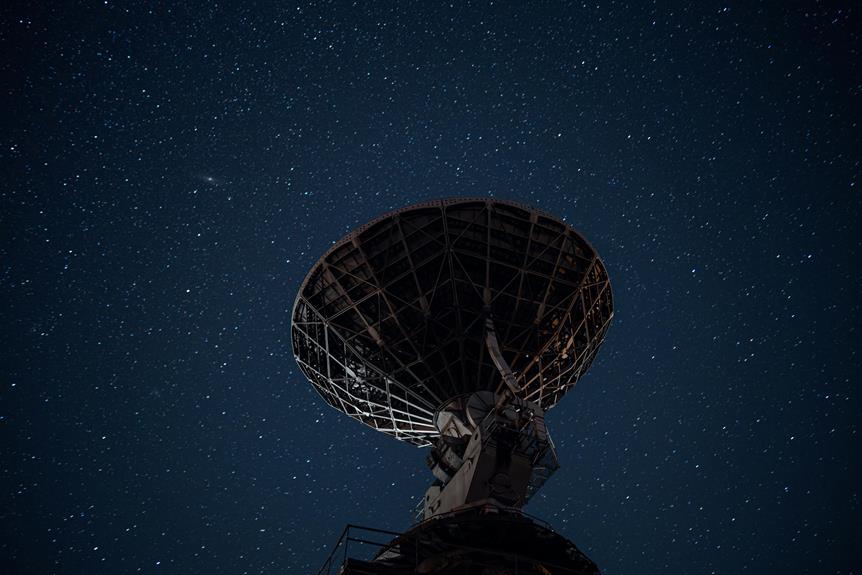Using a Freesat signal checker is crucial for excellent satellite TV reception. Connect the signal checker to your satellite dish via the coaxial cable, then power on the device to display signal strength in decibels and signal quality as a percentage. Monitor these readings to pinpoint weak signals or interference. Adjust the dish alignment for better signal acquisition. Regular checks with high-quality equipment guarantee outstanding signal consistency. Obstructions, weather, and faulty cables often cause signal issues, so inspect and maintain your setup regularly. To master precise satellite alignment and advanced troubleshooting techniques, explore further insights.
Key Information
- Signal strength meters gauge Freesat signal intensity and quality for optimal reception.
- Regular signal checks with a signal checker prevent viewing disruptions.
- Connect the signal checker to the satellite dish via the coaxial cable for accurate readings.
- Professional services like AerialForce utilize specialized tools for in-depth signal performance analysis.
- Align and secure the satellite dish based on signal checker readings to enhance signal quality.
Understanding Freesat Signals
Understanding Freesat signals requires knowing that they're primarily delivered via satellite, necessitating a properly aligned dish for effective reception. Weak or non-existent satellite signals often stem from misaligned dishes, obstructions like trees or buildings, adverse weather conditions, or faulty equipment.
For consistent signal strength, precise installation and regular maintenance of the satellite dish are essential. Ensuring that there are no obstructions in the dish's line of sight to the satellite is crucial. Quality equipment plays an important role; subpar or aging components can lead to degraded signal quality.
In case of persistent issues, professional services like those offered by AerialForce can diagnose and resolve problems, ensuring optimal reception. Regular checks and timely adjustments maintain robust Freesat signal reception.
Tools for Checking Signal Strength
To accurately measure your Freesat signal strength, employing a signal strength meter is essential for precise diagnostics. This device allows you to gauge both the signal's intensity and quality, essential for guaranteeing clear and reliable reception.
Signal quality meters provide detailed insight into the signal's clarity, helping you identify potential reception issues. For remote diagnostics, online signal checkers are invaluable tools, offering quick and accessible signal assessments.
Professional satellite installers often use specialized tools that deliver in-depth data on signal performance. Regularly checking your signal guarantees top-notch reception and minimizes viewing disruptions.
Common Signal Issues
Freesat signal issues often stem from obstructions such as trees or new buildings, poor weather conditions, misaligned dishes, or faulty cabling. Weak or no satellite signal is the primary culprit behind these problems. Obstructions block the line-of-sight to the satellite, while severe weather can disrupt the signal path. Misaligned dishes fail to focus the signal properly, and damaged or substandard cables degrade signal integrity.
Software glitches and outdated firmware in your Freesat box can also cause technical issues. Performing regular maintenance, keeping software updated, and using high-quality components can help maximize these problems.
AerialForce can provide professional assistance by inspecting your dish, adjusting alignment, and checking cables to ensure top-notch signal performance.
How to Use a Signal Checker
By connecting the signal checker directly to your satellite dish, you can accurately measure the strength and quality of your Freesat signal. First, attach the signal checker to the coaxial cable coming from the dish. Power on the device; it'll display signal strength in dB and signal quality as a percentage.
Observe these readings to identify potential issues like weak signal or interference. If the signal strength is low, adjust the dish alignment slowly, monitoring the checker until best readings are achieved. Regularly using a signal checker guarantees consistent signal quality and helps prevent viewing disruptions.
For best results, take measurements in clear weather conditions to avoid misinterpreting data due to temporary atmospheric interference.
Tips for Improving Signal Quality
Ensuring peak signal quality involves inspecting for obstructions like trees or buildings that might block the satellite dish. Properly align and securely mount the dish to achieve a strong signal. Examine all cables for damage and ensure they're properly connected to the Freesat box. Upgrading to a high-quality LNB can greatly enhance signal reception and reliability. Regular maintenance of the dish and cables is essential to prevent signal degradation.
| Action | Benefit |
|---|---|
| Inspect for obstructions | Prevents signal blockage |
| Align and secure the dish | Ensures a strong signal |
| Check and connect cables | Optimizes signal transmission |
Implementing these measures will ensure consistent signal quality and an improved viewing experience.
When to Contact Support
Consistently experiencing weak or no signal on your Freesat box warrants contacting support for a detailed diagnostic and resolution.
If you encounter persistent software issues or outdated firmware, it's important to seek professional assistance.
Suspect a faulty Low Noise Block (LNB) if your signal reception is erratic; support can verify and replace it if necessary.
Hard drive problems, such as freezing or loss of recorded content, also justify reaching out to support for troubleshooting and potential replacement.
Finally, if your Freesat box suffers from power supply problems causing failures or unexpected shutdowns, contacting support can prevent further damage and restore proper functionality.
Don't hesitate to get help; professional intervention guarantees top performance.
Frequently Asked Questions
How to Check Freesat Signal?
To check your Freesat signal, visit the Freesat website's signal checker tool. Enter your postcode or location to receive real-time data on signal strength and channel status, helping you diagnose and resolve any reception issues efficiently.
How Can I Test My Satellite Signal?
To test your satellite signal, you'll need a signal meter or satellite finder. Make sure there are no obstructions like trees. Ideal signal strength is 70-80%. Retest during clear weather for accuracy. Consult a professional if needed.
Why Is My Freesat Not Finding Channels?
Your Freesat isn't finding channels likely due to misaligned dish, damaged cables, or a faulty LNB. Check for obstructions and adverse weather conditions. Regularly inspect signal strength and quality, or consult a professional for precise diagnostics.
Is Freesat Not Working Today?
Check for any service disruptions or maintenance activities that might be affecting Freesat today. Access the service status updates, monitor reported outages, and review user feedback for real-time information on potential signal issues or problems.
Conclusion
By understanding Freesat signals, using the right tools, and identifying common issues, you can effectively check and improve your signal strength.
A signal checker helps pinpoint problems, and following our tips can enhance signal quality.
However, if complications persist, don't hesitate to contact support for professional assistance.
Ensuring paramount signal reception is essential for an uninterrupted viewing experience, and with the right approach, you can maintain a high-quality Freesat service.



